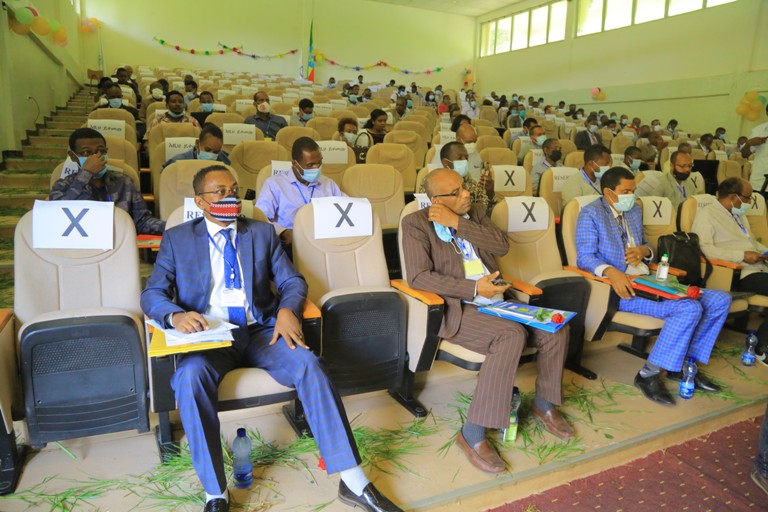Arba Minch University in association with Ethiopian Public Health Institute (EPHI) has organized a 2-day workshop on multi-sectoral inter-disciplinary research findings on moringa stenopetala at New Hall, Main Campus, from 26th to 27th February, 2021. The 1st day saw presentation of 9 research findings that generated a much-needed synergy where researchers, academicians, officials and different stakeholders could discuss the multiple medicinal, epidemiological, biochemical and health benefits of moringa for the society. Click here to see the pictures
The workshop began with AMU President, Dr Damtew Darza, stressing about moringa plant potential that plays significant role in our life and multiple research findings acquired in last 3 years in this regard, he said, will ensure food and nutritional security for the community. And myriad project practices done in this direction are exemplary that should be taken as good learning experiences for they are done in a multi-disciplinary, institutional and diverse professional engagement that demonstrates a culture of teamwork in executing scientific yet very much humanitarian endeavor that will have wide impact in the society.
He adds that Moringa is widely used as food at Arba Minch and in surrounding areas and in conducting research to improve its efficacy Arba Minch University enjoys locational advantage. Since it’s proved that it has food and medicinal value for human health, this tree will have significant national value as a whole and AMU will continue to conduct intensive research to unravel newer dimensions, he added.
Delivering keynote speech, Deputy Director General of Overseas Research & Technology Transfer wing of Ethiopian Public Health Institute, Dr Getachew Tolera, said, there is an urgent need to tap full potential of moringa that requires involvement of science and technology where its research and development can be scaled up and linked with the industry at regional, national and international level.
He further informed that EPHI’s Traditional and Modern Medicine Research & Development Directorate has state-of-the-art laboratories and researchers that collaborate with reputed institutions like AMU that do intensive research in Moringa; so, he said, we act as focal institution to create a platform where researchers and academicians meet to discuss to find new roadmap. In future, EPHI would like to create Moringa medicine that will cure diseases such as diabetes, hyper tensions, etc.
EPHI’s Traditional and Modern Medicine Research & Development Directorate Director, Mrs Frehiwot Teka, said, this workshop in reality igniting consultative debate will generate innovative approaches and diverse scientific techniques that will yield various benefits for the society in the longer run.
Research and Community Service Vice President, Mr Behailu Merdikios, emphasizing on Moringa’s full efficacy, said, because we all know that its roots and bark have antibiotic properties that treat right from sexually transmitted diseases, gout to arthritis and it’s also nutritional supplement and immunity booster but it can be dangerous if used inaccurately. Therefore, new knowledge in this arena will bring to light its employment potential and different ways of production that will boost national economy as well.
Deputy General Director of Southern Agricultural Research Institute, Dr Hamid Jemal, said, his institution is involved in increasing productivity, evaluating efficacy and post-harvest management through different agro-ecology in association with Southern Agricultural Research Institute. He stressed the imminent need to propagate its full utility and support community with advanced technology by exploiting its full potential.
The session begins with Dr Asfaw Debella, speaking on ‘Interdisciplinary Investigational Efforts on Moringa Stenopetala’, said, it has ability to improve health and nutritional status of community that has positive impact on environment and creates economic advantages. It reduces vitamin A deficiency both in kids to adult and doesn’t cause adverse effect on thyroid gland function. Hence, there is need of cohort study for the community to know the health benefits of Moringa consumption.
Thereafter, AMU researcher, Mr Direselign Misker spoke on the epidemiology aspect, followed by EPHI’s, Mr Ashenafi Tadele, who dwelt into epidemiology of diseases. Mr Eskeziyaw Agidew of Debre Markos University discussed health facility-based prospective study among adult population while Ambo University’s Dr Debebe Worku expatiated on microencapsulated nutra-ceuticals product development.
EPHI and AMU jointly sponsored the program; researchers, academicians and officials from Ministry of Innovation & Technology, Southern Agricultural Research Institute, Ethiopian Food & Drug Authority, Ethiopian Biodiversity Institute, Ethiopian Public Health Association, St Paul’s Hospital Millennium Medical College, Ethiopian Environment & Forest Research Institute, Centre Statistical Agency and Horn of Africa Regional Environment Centre & Network were in attendance. Dr Alemayehu Bekele and Dr Assefa Deresa have moderated the program.
(Communication Affairs Directorate)
